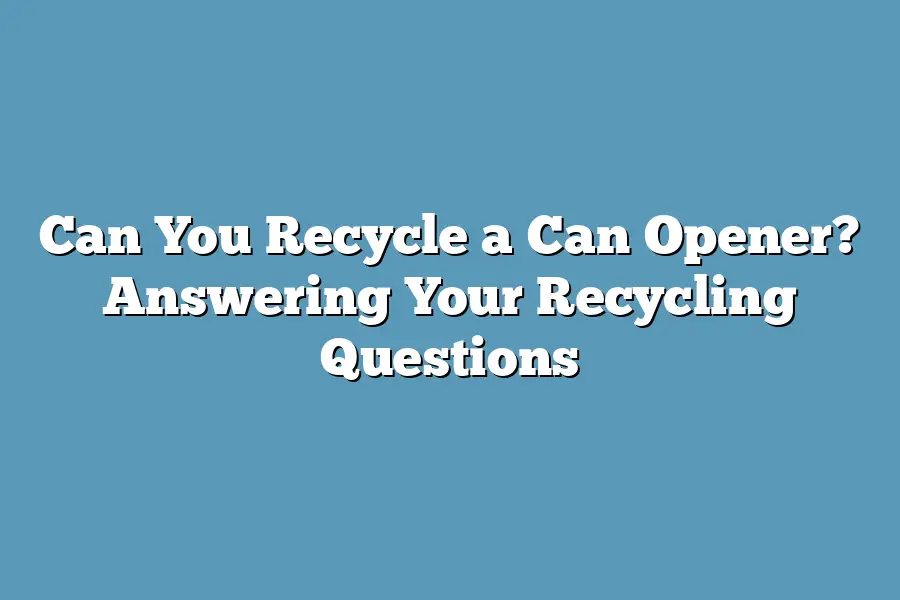While it might be tempting to try to recycle a can opener, unfortunately, most can openers are not recyclable due to their mixed materials composition and small size. However, some manufacturers have started to create more environmentally friendly can openers made from sustainable materials that can potentially be recycled. If you’re concerned about the environmental impact of your can opener, consider looking for eco-friendly options or repurposing your old one in a creative way.
As someone who’s passionate about reducing waste and making a positive impact on our planet, I’ve often found myself wondering: can you really recycle a can opener?
As it turns out, most can openers are indeed recyclable due to their metal composition.
But what about other kitchen items that seem just as guilty of contributing to the growing mountain of trash in our landfills?
In this blog post, we’ll dive into the answers to these questions and explore the surprising truth about recycling in the kitchen.
From tin cans to glass jars, and even plastic containers with that coveted “chaser” symbol, we’ll uncover what’s recyclable and what’s not.
So, let’s get started and discover the simple yet powerful ways you can make a difference by recycling – starting with your trusty can opener!
Table of Contents
Can You Really Recycle a Can Opener?
When it comes to recycling, we often get stuck on the big stuff – plastic bottles, cardboard boxes, and newspaper.
But what about those smaller items that are just as important?
Like your trusty can opener, for instance?
Yes, most can openers are recyclable due to their metal composition!
That’s right; the very tool you use to pry open tin cans is itself made from materials that can be recycled.
Now, I know what you’re thinking: “But how do I prepare my can opener for recycling?” Well, it’s easier than you think.
First, give it a good rinse to remove any remaining food particles (because who wants to eat last night’s leftovers twice?).
Then, flatten or crush your can opener to save space in the recycling bin.
It’s as simple as that!
What About Other Kitchen Items? Are They Recyclable Too?
As it turns out, many other kitchen items are just as recyclable as your can opener.
Let me give you a few examples.
- Aluminum foil: That shiny wrapping paper you use to keep leftovers fresh? Yeah, it’s recyclable! Just make sure to flatten it first.
- Tin cans (including pet food and vegetable cans): These are the usual suspects when it comes to recycling. Rinse them clean, remove any labels or lids, and they’re good to go!
- Glass jars and containers: From jam jars to pickle containers, these can be recycled along with other glass items. Just make sure they’re empty and rinsed clean first.
- Plastic containers with the “chaser” symbol: You know those little triangle symbols on plastic packaging? Those indicate that the item is recyclable! So, go ahead and recycle those plastic containers, but remember to remove any lids or labels first.
Common Recycling Questions Answered
Now, I know you’re probably wondering about some of the other common kitchen items.
Can you really recycle…?
- Glass bottles with lids or caps: Sorry, folks – glass bottles with lids or caps are not recyclable in most cases. But don’t worry; you can still recycle the glass itself.
- Styrofoam packaging materials: Unfortunately, most Styrofoam packaging is not recyclable. However, some community recycling programs do accept it, so be sure to check with your local authorities first.
- Plastic bags and wraps: Ah, those pesky plastic bags! While they’re not usually recyclable in their own right, you can often recycle them by combining them with other plastics or using a special collection program. Just remember to clean and dry them first!
- Batteries (including rechargeable ones): Yes, even batteries are recyclable! Look for designated battery recycling facilities or participate in community collection programs.
Conclusion
So there you have it – the lowdown on recycling your kitchen items, from can openers to glass jars.
Remember: proper preparation is key to ensuring that your recyclables are accepted by local recycling facilities.
Always rinse and prepare your items properly, and you’ll be doing your part for a more sustainable future.
In conclusion, yes, you can recycle a can opener, along with many other kitchen items.
Just remember to always follow the guidelines above, and you’ll be well on your way to becoming a recycling rockstar!
What About Other Kitchen Items? Are They Recyclable Too?
You’ve got a can opener on the brain (or should I say, in the recycling bin?).
But what about other kitchen items that are just as pesky?
Can you really recycle aluminum foil, tin cans, glass jars, and plastic containers with the “chaser” symbol?
The answer is: absolutely!
And let me tell you why.
Aluminum foil, for instance, can be recycled along with steel and copper.
In fact, recycling just one ton of aluminum saves a whopping 14 million kilowatt-hours of electricity – that’s enough to power around 1,400 homes!
Tin cans are another story.
You might be thinking, “Wait, aren’t tin cans the same thing as regular metal cans?” Well, not quite!
Tin is a different alloy altogether, and it can be recycled separately.
So go ahead and toss those pet food and veggie cans into the recycling bin – they’ll do just fine.
Now, about glass jars and containers…
Ah, yes!
Glass is one of the easiest materials to recycle.
It’s made from sand, soda ash, and limestone, which can all be extracted and reused in new products.
Plus, recycling glass saves energy equivalent to burning 10 gallons of gasoline!
Last but not least, we have plastic containers with the “chaser” symbol (those little triangles).
These containers are often made from a type of plastic called polyethylene terephthalate (PET) or high-density polyethylene (HDPE).
As long as they’re free of contamination and have the correct symbol, you can recycle them right alongside your milk jugs and water bottles!
Common Recycling Questions Answered
I’m sure you’ve asked yourself some pretty pressing questions about recycling at one point or another.
Like, can I recycle a can opener?
Or how about those pesky plastic bags and wraps that seem to multiply in your kitchen?
Well, wonder no more!
Today, we’re tackling the most common recycling concerns out there.
Glass Bottles with Lids or Caps: Can You Really Recycle Them?
You might be surprised to learn that glass bottles are one of the easiest things to recycle.
And I’m not just talking about plain old glass jars – I mean those fancy-schmancy ones with lids or caps too!
According to the US Environmental Protection Agency (EPA), glass is 100% recyclable and can be recycled endlessly without losing its quality.
So go ahead, toss that jar of marinara sauce into the recycling bin along with the lid.
Your local recycling facility will thank you!
Styrofoam Packaging Materials: The Not-So-Clear Answer
Now, when it comes to Styrofoam (also known as expanded polystyrene or EPS), things get a little murkier.
Unfortunately, most cities don’t have facilities that can recycle Styrofoam packaging materials like peanuts, bubble wrap, or those pesky packing “inflatable” containers.
But here’s the thing: if you’re using Styrofoam to protect something delicate during a move, make sure to flatten it as much as possible and bundle it with other recyclables.
Your local recycling facility might be able to accept it (check their guidelines first!).
Just don’t expect them to take it in its inflated form – sorry, folks!
Plastic Bags and Wraps: Can You Really Recycle Them?
You know those pesky plastic bags and wraps that always seem to find their way into your kitchen?
Well, the answer is…
maybe.
Some cities have special facilities that can recycle these types of plastics, while others don’t.
The key here is to check with your local recycling facility or waste management provider to see if they accept plastic bags and wraps.
If they do, make sure to flatten them out as much as possible before tossing them in the recycling bin.
Batteries (Including Rechargeable Ones): Recycling’s Secret Superpower
Last but certainly not least, let’s talk about batteries!
You might be surprised to learn that rechargeable batteries like nickel-cadmium (Ni-Cd), nickel-metal hydride (NiMH), and lithium-ion (Li-ion) can be recycled.
And the best part?
It’s a game-changer for reducing electronic waste.
So, don’t toss those old rechargeables just yet!
Instead, take them to a local electronics recycling facility or participate in community collection programs.
Final Thoughts
As we wrap up this discussion on recycling kitchen items, I’m reminded that even the smallest actions can make a big difference.
By taking the time to properly recycle our cans, foil, and other kitchen waste, we’re not only reducing waste sent to landfills but also conserving natural resources for future generations.
In conclusion, yes, you can recycle a can opener, along with many other kitchen items.
The key is to take a few simple steps: rinse your recyclables clean, remove any remaining food particles, and flatten or crush them to save space.
By doing so, we’re not only keeping our planet cleaner but also supporting the production of new products from recycled materials.
Remember to always rinse and prepare your recyclables properly to ensure they’re accepted by local recycling facilities.
It may seem like a small task, but every little bit counts when it comes to making a positive impact on our environment.


